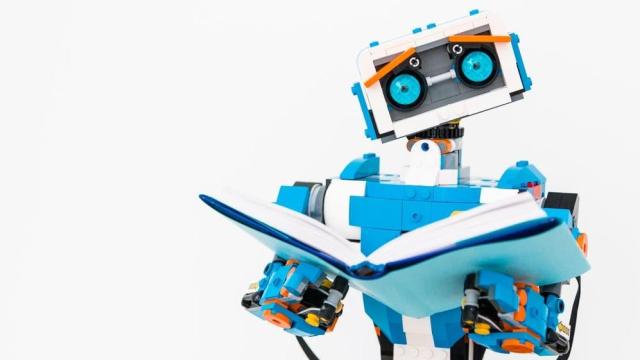A student used ChatGPT to cheat on an essay in an AI ethics class, according to a report from NBC Bay Area. To quote the scorpion in a famous fable, “lol. lmao.”
“The irony is very clearly there,” Santa Clara University professor Brian Green told NBC. The essay in question “wasn’t exactly on topic and, also, it had a very kind of, honestly, a robotic feel to it in some ways.”
The student used ChatGPT to spit out an essay for Green’s “Ethics in Artificial Intelligence” class and turned it in as their own work, the professor said. Green said he’s no longer going to require essays as a final project for Ethics in Artificial Intelligence, replacing them with oral presentations given in person. Several Bay Area universities have convened their professors to discuss the implications of generative chatbots that can spit out essays in seconds, according to NBC.
This is only the latest of several media reports about the cheat-tool of the century. The New York Post published a story Friday about a ChatGPT cheating scandal “erupting” in a Florida gifted students program. In both of these cases, the cheating was easy to detect because — news flash — ChatGPT writes like a robot, and if you just submit an essay that looks different from your other writing, your teacher will see the difference.
The Floridian cheaters reportedly admitted their misbehavior when teachers called them out on it. One teacher who spoke to the New York Post called it “heartbreaking,” that a normally hardworking group of teenagers would deploy a low-effort scheme to get out of homework duties.
What is ChatGPT, and why all the fuss?
ChatGPT hit the world stage in November, and in its short lifespan, it’s sparked a media meltdown, motivated billion-dollar business moves, and disappointed an army of users who found out the hard way that the chatbot won’t write a dirty limerick about former president Trump. (Believe me, I’ve tried.)
The loudest complaint is that AI is going to take our jobs, but academic dishonesty is a close second. School administrators are working hard to get out in front of the problem, not necessarily by changing their curriculum, but often through foolhardy attempts to ban the ChatGPT website. Good luck. The AI is forbidden in a growing list of schools, including public schools in New York City, Los Angeles, Seattle, Fairfax County Virginia.
These fears aren’t imaginary, or at least, the problem isn’t. Sam Altman, the CEO of ChatGPT’s maker OpenAI, said in a recent interview that schools need to get over it.
The stages of playing with ChatGPT:
– OMG this can do anything
– There goes my job
– I should start a business around this
– Some of the responses aren’t too good
– Actually, some of these responses are just awful
– This isn’t really intelligence
– This is just spicy autocomplete https://t.co/AFQWfA5pgb— The Spry Old Lorax (@SpryOld) February 15, 2023
“Generative text is something we all need to adapt to,” Altman said in a discussion in January. “We adapted to calculators and changed what we tested for in maths class, I imagine. This is a more extreme version of that, no doubt, but also the benefits of it are more extreme, as well.”
ChatGPT is admittedly a lot cooler than a calculator, and more broadly useful for cheat-loving students. But Altman may have a point. We’re living at the beginning of a new era, to some degree, and there are certain writing tasks that computers can do now with minimal human input — especially if you want to say something basic about the kind of subject you’d study in a 10th grade English class.
Why use ChatGPT to cheat when it’s so obvious?
There is something delightfully cynical about using ChatGPT in a class about AI ethics, though. Green, the Bay Area professor who caught the cheater, heads Santa Clara University’s Technology Ethics program. As you would hope, his approach is more thoughtful than trying to ban the tech altogether.
“This gets into some very fundamental questions about what the educational system does and how it operates and how it should function in society,” Green told NBC. Hence why he’s changing the homework from essays to presentations.
“We could have engineers, writers, business people, all sorts of people going out into society and we find out that they’ve just been cheating their way through all their classes,” Green said. “If we can’t evaluate on a very basic level whether [students] have learned what we’ve taught them, then we’re going to be in big trouble.”
Unfortunately for teachers, ChatGPT and its offspring are here to stay (including a startlingly unhinged and sometimes racist Bing). Modern problems require modern solutions. and schools are going to have to work with, not against, our new chatbots if they want to prepare kids for life in the AI era. That’s not an easy assignment, but teachers have to do their homework sometimes, too.
The good news is that given enough time, cheaters can go on to be productive members of society. History fans might remember President Joe Biden’s first failed run for the White House back in 1987. A younger but somehow more bald Biden dropped out of the race after just three months when news spread that he’d committed plagiarism, both in his campaign and when he was in law school. And look at him now! Maybe there are bigger things to worry about than cheating robots.
